Spotlight on the Queer Farmers Reimagining American Agriculture
A nascent movement of LGBTQ+ farmers is working to build community in rural spaces and provide an alternative to Big Ag.
Spotlight on the Queer Farmers Reimagining American Agriculture
A nascent movement of LGBTQ+ farmers is working to build community in rural spaces and provide an alternative to Big Ag.
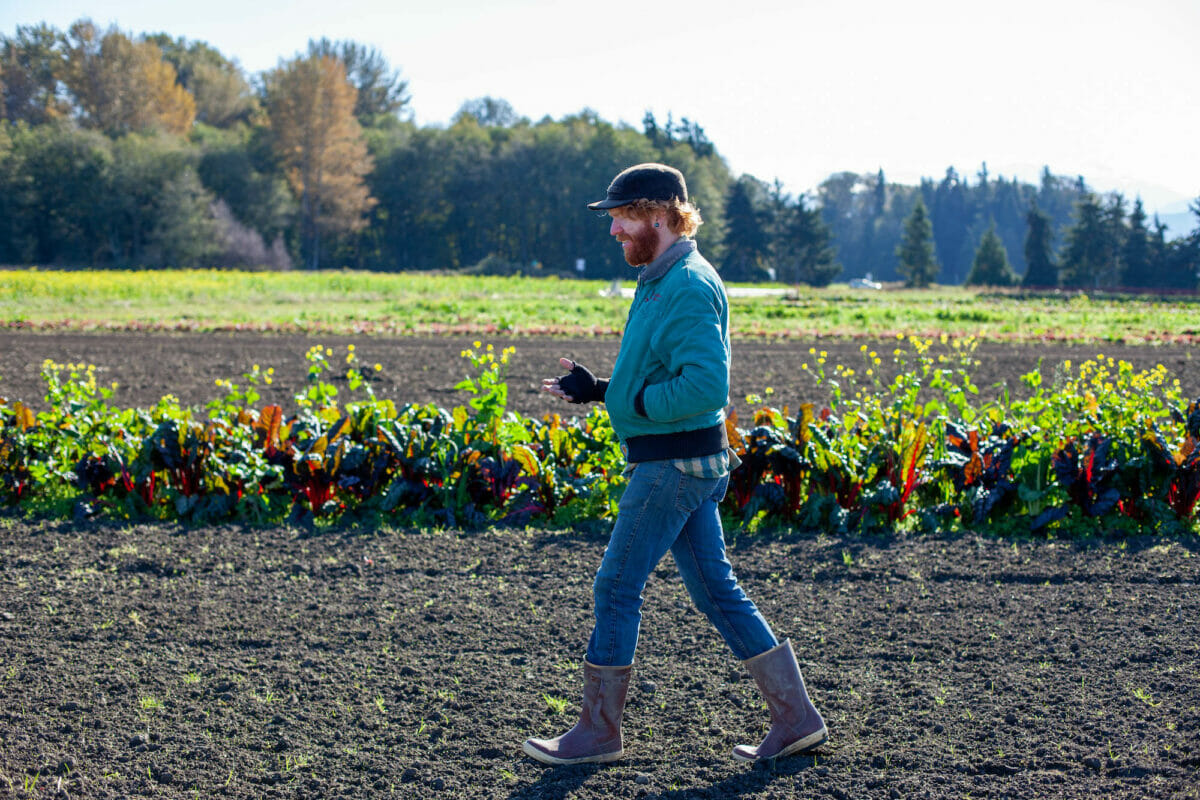
Queer farmers like Sweet Potato, above, are dedicated to building community in rural and agricultural spaces.by Emma Banks.
If you ask queer farmer Hannah Breckbill to tell you about the day that changed everything, she’ll likely point to an afternoon in January 2018. She was one year into cooperatively owning her own land, alongside her business partner Emily Fagan, and there was hardly another queer in sight. The people of Decorah, Iowa (population: 7,701) were welcoming, sure, but traditionally heteronormative (meaning treating heterosexuality as the norm). Finally, Breckbill called her friend one afternoon in tears, wondering where she would find queer community in a town, which seemingly had none.
“She said, ‘Here’s what we’re going to do about it. We’re going to start an Instagram. We’re going to host queer farmers. We’re going to start a conference,’” Breckbill says. “And we did!”
This is the origin story of Queer Farmer Convergence (otherwise known as QFC), a three-day conference that takes place every September on Breckbill’s farm, Humble Hands Harvest. Here, queer utopian imaginings come to life in the form of workshops, talks, small groups and family dinners. Not unlike the mythologized lesbian seperatism of yore, these meet-ups are blissful, albeit brief. Luckily, when Breckbill and the 50 or so attendees return to their day-to-day realities, they have plenty to unpack and explore until next September rolls around.
Breckbill is, of course, not alone in her urge to gather together with other rural queers. It can be challenging to build and maintain a network of LGBTQ neighbors and allies when people live many miles apart. This is especially true when compared to city living, where folks live in close quarters and you’re much more likely to live near a gay or lesbian bar. Nonprofits like Out in the Open, Cultivating Change Foundation and Lesbian Natural Resources, as well as projects like Idyll Dandy Arts, The Quinta and Country Queers are all dedicated to building community in rural and agricultural spaces: “It’s really important to me to craft a gathering where everyone is welcome and comfortable and there’s a sense of belonging,” Breckbill says.
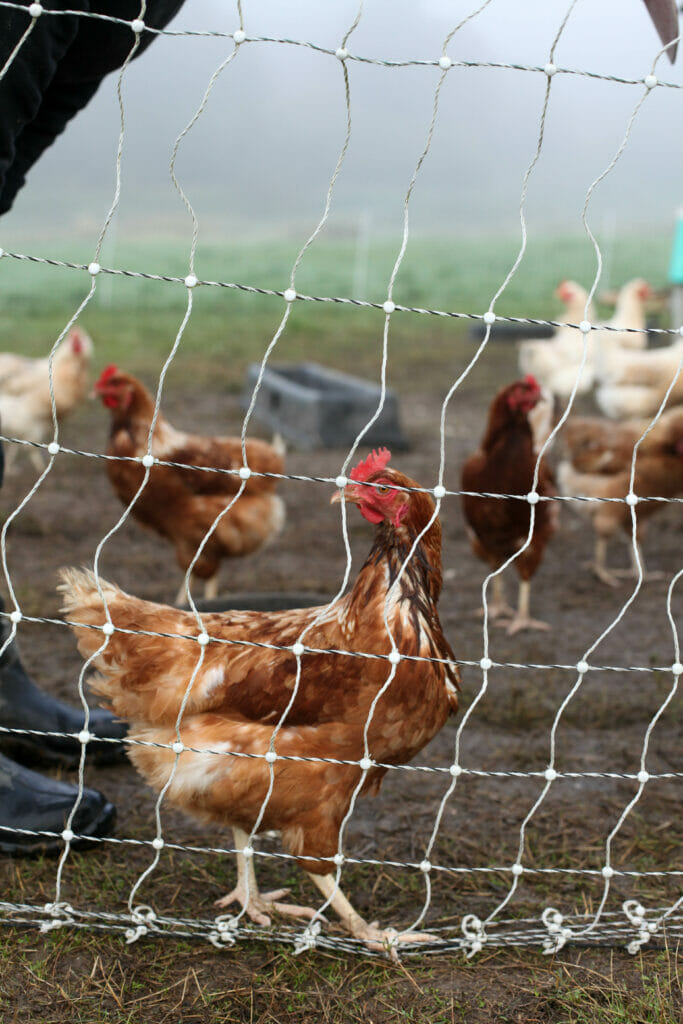
Agriculture in the United States has historically been a white, male-dominated industry. According to the 2014 farm census, more than 92 percent of American farmers are white and more than 86 percent are men. While the census does not collect data about sexuality or gender identity, there have been efforts to gather this information. A 2020 paper titled “Queer Farmers in the 2017 US Census of Agriculture”, for example, presents research that “suggests queer farmers are both more prevalent than expected and different from other farmers in significant ways.” But in what ways are queer farmers different than their straight, cis counterparts? And do those differences have the potential to alter or improve American agriculture as we know it?
The American food system and agriculture industry were hit incredibly hard during the pandemic, and economic gaps between huge industrial farms and small operations were laid bare. Major corporations continued to profit off of low-wage labor and large-scale monoculture farming. Meanwhile, projects rooted in sustainability and regenerative practices often relied on their local communities to stay afloat. Many queer farmers fall into the latter category, continuously questioning the system even as they participate in it—and dreaming up alternatives in the process.
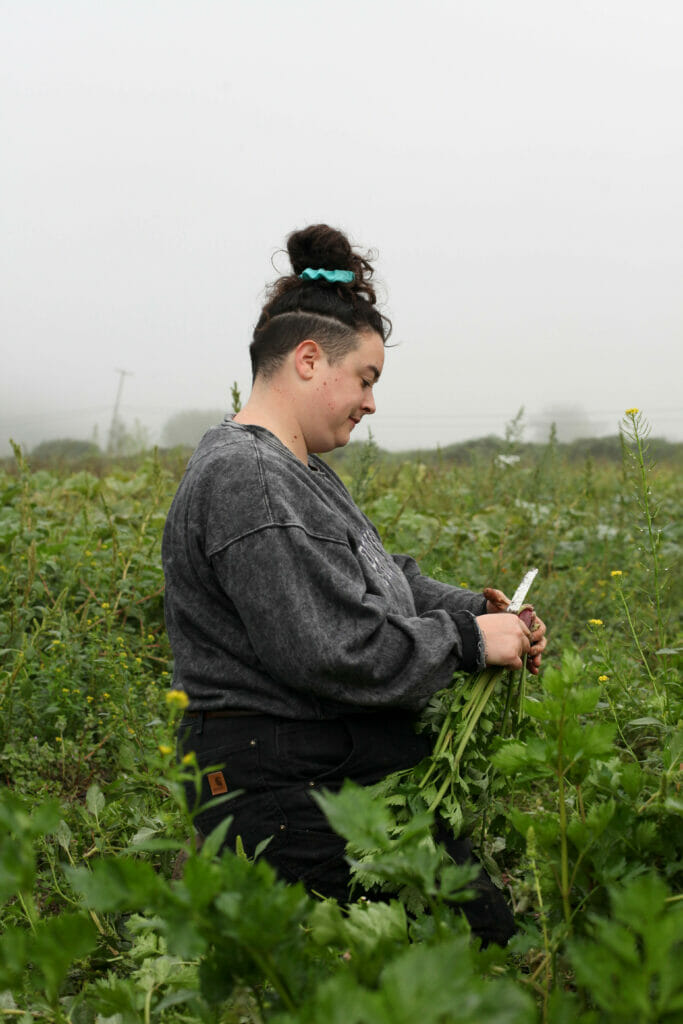
“For me, queering the systems of capitalism means that, when I have a farm, making sure people are being paid a living wage, versus just minimum wage,” says Coco Faria, a queer farmer in Washington State. “And also, giving food away. There’s so much opportunity to do that sort of stuff in farming, but it’s also such a hard job, and often people just don’t bother because they’re just trying to get it done. But if you slow down and look at all of those things, you’ll feel better. You’ll be able to bring more people into the community, and it will be a community experience rather than just something you do alone.”
Further south, on Sauvie Island outside of Portland, Oregon, the Raceme Farm Collective is working to heal what has historically been a traumatic relationship to the land for Black and brown folks. Allinee “shiny” Flanary of Scrapberry Farm, Letty Chichtonyolotli Martinez of Flying Dogheart Farm and Xóchitl Garnica of Chalchi Farm form the three-person collective.
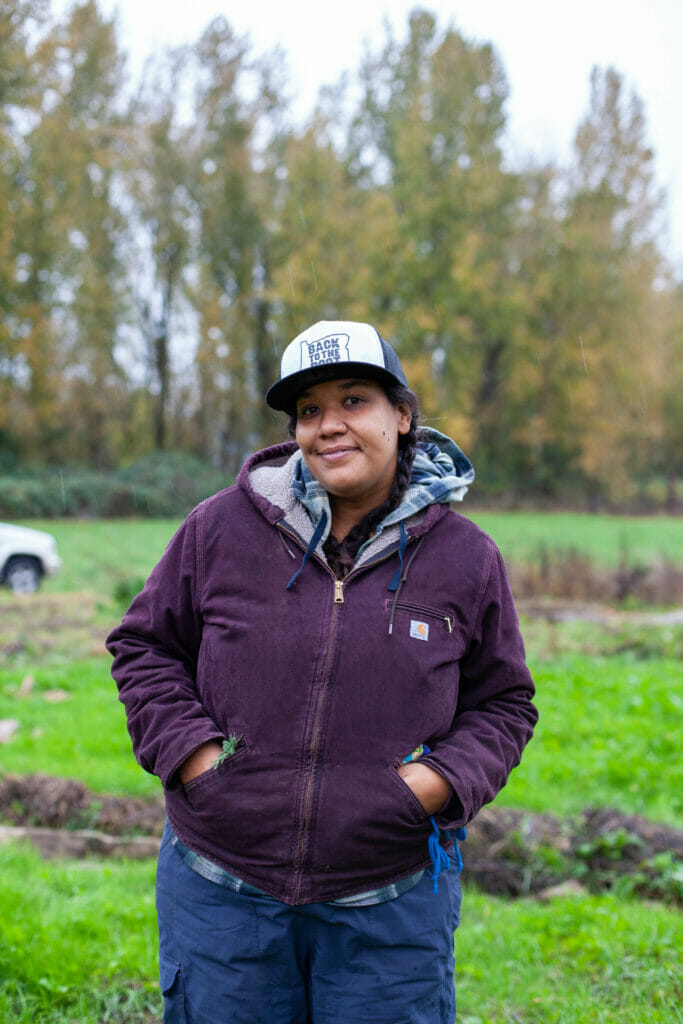
“People started saying to me, ‘You look more whole, more healthy, more happy. What are you doing?’” Flanary says. “I’m just fucking around, putting seeds in the ground, trying to figure out what happens. You know? It’s been a very meandering journey, fueled by those competing forces of trauma and liberation, trying to heal individually while recognizing that we are at our best when we work collectively. You gotta be aware of your shit, and address what you need to work on, and also know that there is no way to get free from this struggle by yourself. So working in a collective has always been at the heart of my farming journey. I came into it knowing that it wasn’t something I would do alone.”
Similarly, Martinez emphasizes that queer farming is not a relationship of exploitation—one where the land gives and the farmer takes—but rather one of mutual respect. “I’m learning the names of these plants; eventually I’ll learn their songs. If I’m making medicine I need to learn how to stay in my lane and know my boundaries as a guest. Sing to the land! Tell it stories. Even before we got the land, I asked if I could just come by and say hi and sing. It’s a wooing; Can I come here? Will you have us? It’s tapping into that unknown, and leaning into it.”
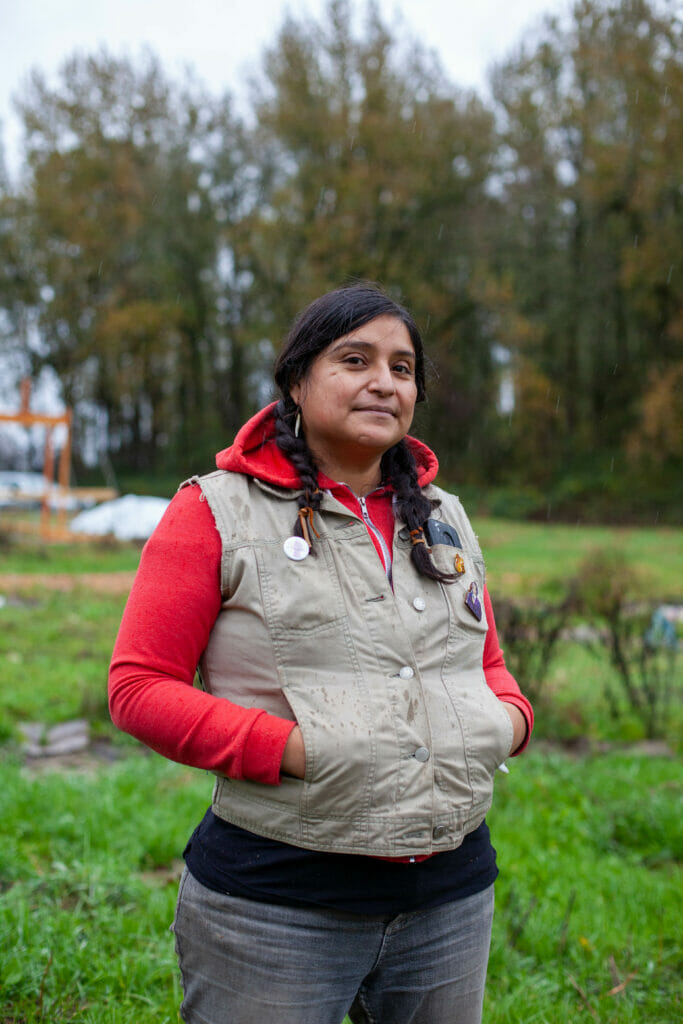
Back in Iowa, Breckbill knew she wanted Humble Hands Harvest to be cooperatively owned for a similar reason to the Raceme Collective: so that she could work in community. For Sweet Potato, a trans farmer working at River Run Farm on the Olympic Peninsula, a co-op model also feels like the right call.
“I see cooperatives as one of many antidotes to [hierarchies],” they say. “Members of the cooperative have an ownership stake in the land; they have a say in how it’s operated and what is done with the profits or the business. Capitalism is about how the capital is controlled; you’re extracting the value of people’s labor, and in the case of farming, the value that we produce in the fields, and funneling it toward the top. Whereas a cooperative farm is about the farmers deciding how that capital will be distributed and spent.”
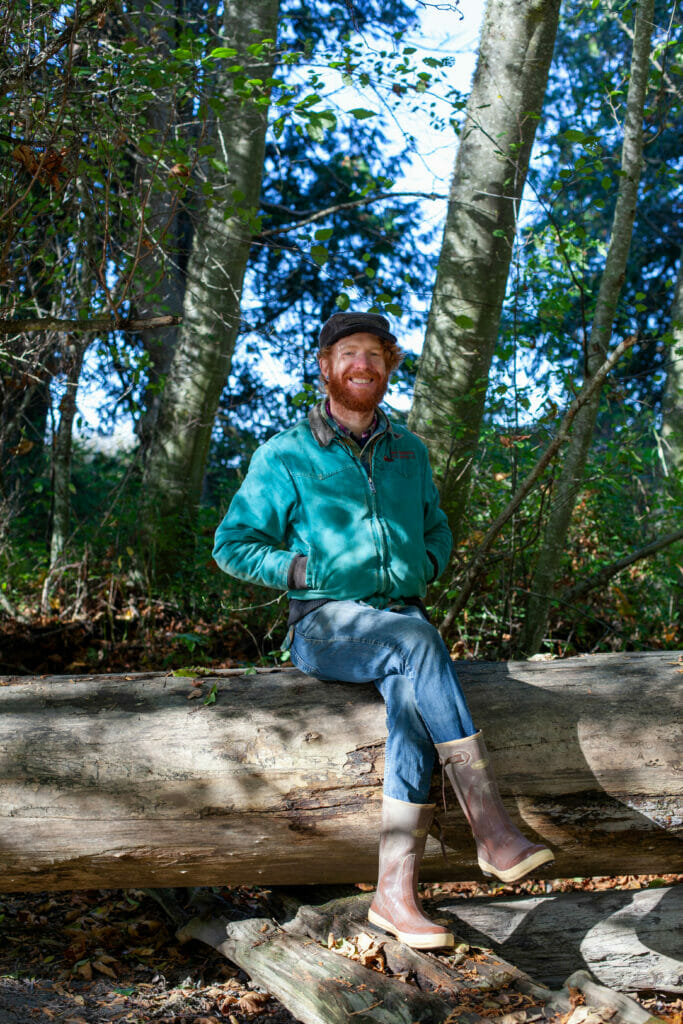
These ideals—cooperative ownership, respect for the land and community prioritization—all make up what is a queerer vision for American agriculture. In the midst of an ongoing global pandemic and the threat of Big Ag monopolies, perhaps this vision seems difficult to adopt. For queer farmers, however, it’s essential.
“If we acknowledge that the systems are working in the way they were designed, then I don’t want to leave people with no way forward,” Flanary says. “What do you do with that? Is it just hopeless? I think that people have to let in some hard truths about food, first and foremost. Talk to farmers! Food is not cheap. That’s the system at work—it is giving some people abundance, and relegating others to intense scarcity…if you do nothing else with that information, just be curious. How does that truth show up in your own neighborhood? I really believe we’re all going to get free block by block, and that requires you getting to know your neighbors, talking to them, and understanding how that food system operates on your block. That’s huge work.”
Follow us
This work is licensed under a Creative Commons Attribution-NoDerivatives 4.0 International License.
Want to republish a Modern Farmer story?
We are happy for Modern Farmer stories to be shared, and encourage you to republish our articles for your audience. When doing so, we ask that you follow these guidelines:
Please credit us and our writers
For the author byline, please use “Author Name, Modern Farmer.” At the top of our stories, if on the web, please include this text and link: “This story was originally published by Modern Farmer.”
Please make sure to include a link back to either our home page or the article URL.
At the bottom of the story, please include the following text:
“Modern Farmer is a nonprofit initiative dedicated to raising awareness and catalyzing action at the intersection of food, agriculture, and society. Read more at <link>Modern Farmer</link>.”
Use our widget
We’d like to be able to track our stories, so we ask that if you republish our content, you do so using our widget (located on the left hand side of the article). The HTML code has a built-in tracker that tells us the data and domain where the story was published, as well as view counts.
Check the image requirements
It’s your responsibility to confirm you're licensed to republish images in our articles. Some images, such as those from commercial providers, don't allow their images to be republished without permission or payment. Copyright terms are generally listed in the image caption and attribution. You are welcome to omit our images or substitute with your own. Charts and interactive graphics follow the same rules.
Don’t change too much. Or, ask us first.
Articles must be republished in their entirety. It’s okay to change references to time (“today” to “yesterday”) or location (“Iowa City, IA” to “here”). But please keep everything else the same.
If you feel strongly that a more material edit needs to be made, get in touch with us at [email protected]. We’re happy to discuss it with the original author, but we must have prior approval for changes before publication.
Special cases
Extracts. You may run the first few lines or paragraphs of the article and then say: “Read the full article at Modern Farmer” with a link back to the original article.
Quotes. You may quote authors provided you include a link back to the article URL.
Translations. These require writer approval. To inquire about translation of a Modern Farmer article, contact us at [email protected]
Signed consent / copyright release forms. These are not required, provided you are following these guidelines.
Print. Articles can be republished in print under these same rules, with the exception that you do not need to include the links.
Tag us
When sharing the story on social media, please tag us using the following: - Twitter (@ModFarm) - Facebook (@ModernFarmerMedia) - Instagram (@modfarm)
Use our content respectfully
Modern Farmer is a nonprofit and as such we share our content for free and in good faith in order to reach new audiences. Respectfully,
No selling ads against our stories. It’s okay to put our stories on pages with ads.
Don’t republish our material wholesale, or automatically; you need to select stories to be republished individually.
You have no rights to sell, license, syndicate, or otherwise represent yourself as the authorized owner of our material to any third parties. This means that you cannot actively publish or submit our work for syndication to third party platforms or apps like Apple News or Google News. We understand that publishers cannot fully control when certain third parties automatically summarize or crawl content from publishers’ own sites.
Keep in touch
We want to hear from you if you love Modern Farmer content, have a collaboration idea, or anything else to share. As a nonprofit outlet, we work in service of our community and are always open to comments, feedback, and ideas. Contact us at [email protected].by Emma Banks, Modern Farmer
January 3, 2022
Modern Farmer Weekly
Solutions Hub
Innovations, ideas and inspiration. Actionable solutions for a resilient food system.
ExploreExplore other topics
Share With Us
We want to hear from Modern Farmer readers who have thoughtful commentary, actionable solutions, or helpful ideas to share.
SubmitNecessary cookies are absolutely essential for the website to function properly. This category only includes cookies that ensures basic functionalities and security features of the website. These cookies do not store any personal information.
Any cookies that may not be particularly necessary for the website to function and are used specifically to collect user personal data via analytics, ads, other embedded contents are termed as non-necessary cookies.
Wow, I am disappointed by the comments on this article. I am not a queer person but I think it’s great to hear about people who have historically been marginalized coming together to do something that they love.
Big thanks to all the queero’s offering models of support and collaboration that are needed now more than ever in the modern era of farming that we find ourselves in. Cheers to having diverse leaders in the food system who are facilitating connections, sharing knowledge, and mostly, being in right relationship to the land and each other, while tending the land to feed community.
Thank you for this insightful article. I appreciate the values that the interviewed farmers share. The idea of cooperatives is a great start. The cooperative system has been stolen by the capitalists with most coops functioning like a corporation. Some of this is the shareholders fault – acquiescing to the corporate model. Democracy is at risk in our country and modeling cooperatives is a good way to show people there are other ways of doing business.
Thanks for the article! Great to see my experiences reflected, and to hear from others.
I’m a member of LGBT community I live in rural PA, I dont feel I need to advertise my sexual preferences to be a farmer ,it was what I was born to do ! You put your heart and soul into the land ,and it will give back to us , don’t take more than you can use and be a good person ,the rest will fall into place! We are loved and respected by our community for who we are as people ! Don’t be to quick to label ourselves!!
Love the article! Great info
Thank you for this article, and especially for bringing awareness to the QFC! Also, thank you for leaving the comments section open as an (unintended) demonstration of the amount of homophobia in farming. I hope to see more articles like this. 😀
As a queer farmer, looking at their Instagram I was excited reading this to see who else is out there. Then I see the Instagram account of nothing but naked people? The hell does that have to do with any farming and furthering a group of people. Please explain how modern farmer as a company thinks this is okay.
More silliness. I’m gay myself but wonder if I’m ‘queer’ enough these days being a white male. The queer farmers profiled here look like they’re following a very niche business model that won’t result in much production or income for these farmers. I see it in my own semi-rural area where these types of farms produce nice but overpriced products only affordable to the wealthy elites from the cities who have moved up here recently or just come on weekends.
Interesting story, but queer farmers are not really different from other farmers. Any farmer worth their salt works with the land and gives back to it, even corporate farms do this. If you don’t give to the land, the land won’t give to you for long. Hope queer farmers are getting out to other farms, see what they are doing, share best practices. Face it…in the end, who produces the food isn’t as important as what is produced, how much, and to what standard. ALL farmers deserve our respect and our support.